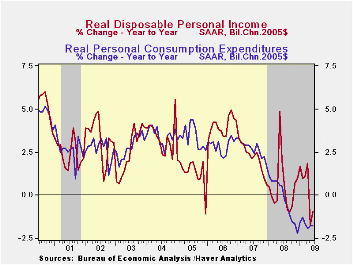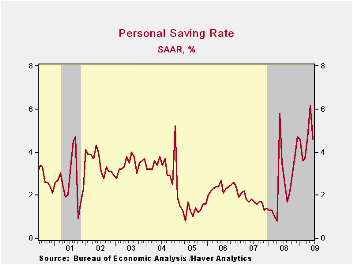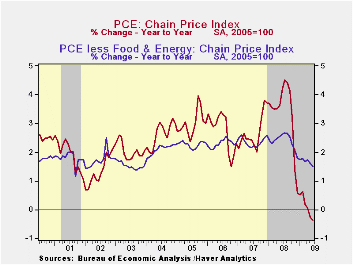 Global| Aug 04 2009
Global| Aug 04 2009U.S. Personal Income Reverses Large May Gain While Savings Rate Tumbles
by:Tom Moeller
|in:Economy in Brief
Summary
As "automatic stabilizers" vanished, June personal income reversed all of the prior month's jump with a 1.3% decline. Government payments to individuals dropped 6.0% as "other" stimulus payments reversed the May gain with a 16.5% [...]

As "automatic stabilizers" vanished, June personal income reversed all of the prior month's jump with a 1.3% decline. Government payments to individuals dropped 6.0% as "other" stimulus payments reversed the May gain with a 16.5% decline (-7.3% y/y). As might be expected, wages & salaries, remained under pressure with the weak job market. The 0.4% decline from May was the ninth decline in the last ten months (-4.7% y/y). In the goods producing industries, wages have been particularly hard hit and are down 11.4% y/y. In addition, the decline in interest rates has taken its toll on interest income which in June was off 3.7% y/y while fewer dividends were paid by the corporate sector (-24.4% y/y). These latest figures reflect benchmark revisions which generally lowered income and the June decline roughly matched Consensus expectations for a 1.0% drop.
With lower income came lower taxes. Tax payments fell 1.5% last month and they were down by nearly one-quarter since December. Nevertheless, disposable personal income fell 1.3% last month. So far this year disposable income has risen at a 1.7% annual rate which very much reflects sharp downward revisions to earlier figures. Adjusted for inflation, real disposable income also reversed the May gain and fell 1.8%. Revisions dropped growth in real take-home pay to a negative 0.4% since December whereas earlier figures showed firm growth.
Whatever it takes, consumers have attempted to rebuild their balance sheets. Though the personal savings rate backpedaled last month with the income drop, the 4.6% figure was near the highest since 1998 despite the downward income revisions.
Restraint on spending has driven the rise in savings. June personal consumption expenditures about matched expectations and rose just 0.4%. They are up 2.5% at a annual rate so far this year. However, that growth largely reflects the rise in gasoline prices. Adjusted for inflation, June spending slipped 0.1% and so far this year it is up at just a 0.4% annual rate. (The details behind this restraint will be available later this week.)
Pricing power continues to held back by sluggish spending. The PCE chain price index rose 0.5% last month, largely due to the rise in energy prices. Less food and energy prices rose just 0.2%. Combined with weakness during prior months, the y/y gain in core prices dropped to 1.5% which was its lowest since 2003. The latest increase in prices matched Consensus expectations.
The personal income & consumption figures are available in Haver's USECON and USNA databases.
Bank Supervision is today's Senate testimony by Fed Governor Daniel K. Tarullo and it can be found here.
| Disposition of Personal Income (%) | June | May | Y/Y | 2008 | 2007 |
|---|---|---|---|---|---|
| Personal Income | -1.3 | 1.3 | -3.4 | 2.9 | 5.6 |
| Disposable Personal Income | -1.3 | 1.6 | -1.3 | 3.9 | 4.9 |
| Personal Consumption Expenditures | 0.4 | 0.1 | -2.2 | 3.1 | 5.4 |
| Saving Rate | 4.6 | 6.2 | 3.5 (June '08) | 2.6 | 1.7 |
| PCE Chain Price Index | 0.5 | 0.1 | -0.4 | 3.3 | 2.7 |
| Less food & energy | 0.2 | 0.1 | 1.5 | 2.4 | 2.4 |
Tom Moeller
AuthorMore in Author Profile »Prior to joining Haver Analytics in 2000, Mr. Moeller worked as the Economist at Chancellor Capital Management from 1985 to 1999. There, he developed comprehensive economic forecasts and interpreted economic data for equity and fixed income portfolio managers. Also at Chancellor, Mr. Moeller worked as an equity analyst and was responsible for researching and rating companies in the economically sensitive automobile and housing industries for investment in Chancellor’s equity portfolio. Prior to joining Chancellor, Mr. Moeller was an Economist at Citibank from 1979 to 1984. He also analyzed pricing behavior in the metals industry for the Council on Wage and Price Stability in Washington, D.C. In 1999, Mr. Moeller received the award for most accurate forecast from the Forecasters' Club of New York. From 1990 to 1992 he was President of the New York Association for Business Economists. Mr. Moeller earned an M.B.A. in Finance from Fordham University, where he graduated in 1987. He holds a Bachelor of Arts in Economics from George Washington University.
More Economy in Brief
 Global| Feb 05 2026
Global| Feb 05 2026Charts of the Week: Balanced Policy, Resilient Data and AI Narratives
by:Andrew Cates






